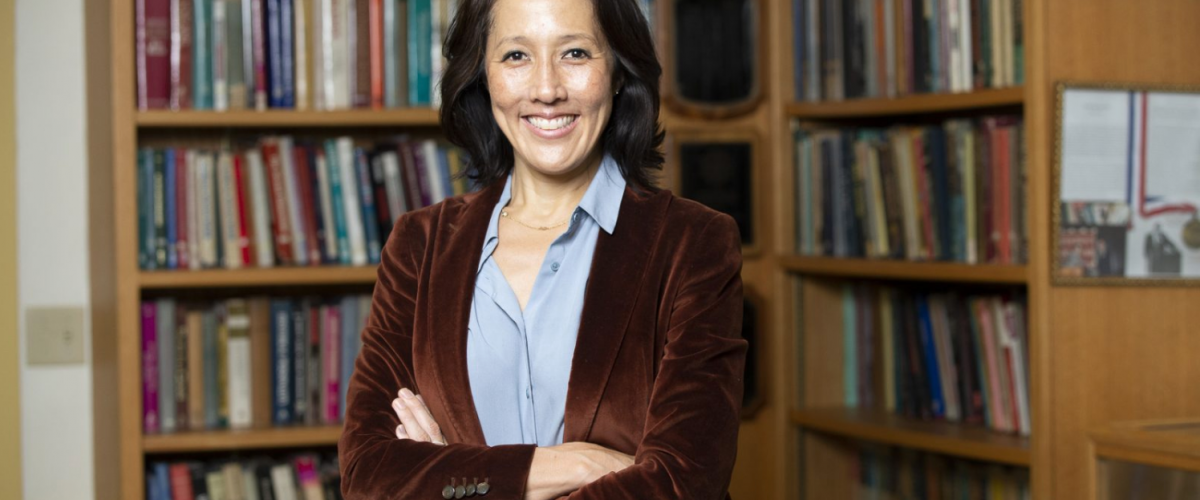Dr. Christina Lee Brings Expertise in Intervention Science, Addiction Psychology, and Health Disparities Research to BUSSW
Effective August 1, 2019, Christina Lee, PhD, a licensed psychologist, was appointed associate professor with tenure at BUSSW. Dr. Lee’s pioneering research on immigrant health and the reduction of risky behaviors by tailoring evidence-based interventions is advancing the science of treating substance use disorders and improving mental health outcomes for culturally diverse populations. Her expertise will also inform her new role as inaugural director of the Research Core at BUSSW’s Center for Innovation in Social Work and Health.
Dr. Lee’s expertise in motivational interviewing and brief interventions led her to question the nature of substance use and whether current treatment strategies were as effective as they could be. Discussing the critical gaps in knowledge in the health care system, Lee notes, “When I began my research, the notion of investigating environmental factors like social stressors and cultural influences as key influences on health risk behaviors, and that interventions should address social stressors to improve health, was relatively unstudied. The key challenge for me was: how do I show, in a rigorous and systematic way in a clinical trial, that addressing social stressors like discrimination or unemployment can help people cope without drinking or using drugs? To address this question, I’ve collaborated with public health researchers, medical sociologists, and addiction scientists. Through it all, what is most important to me is that the work serves to amplify the needs of communities.”
Dr. Lee’s work bridges the areas of intervention science, addiction psychology, and health disparities research. She has an extensive portfolio of NIH-funded projects as principal investigator or co-investigator researching topics such as the efficacy of culturally adapted motivational interviewing, underlying mechanisms of behavior change in behavioral treatments for addiction, the use of inexpensive technology to disseminate empirically-based treatment of substance use disorders, clinician decision-making with minority adolescents, and outcomes of training medical staff to deliver brief interventions.
Looking ahead to the opportunities in her field, Lee says, “Clinically, I want to provide training and support to interdisciplinary teams that take on community-based approaches to help addicted individuals and families. As a researcher, I want to understand how we can best implement and disseminate evidence-based addiction treatments to settings beyond health care offices — to imagine research that is done in collaboration with community partners and reaches those in greatest need of addiction treatment.”
Before joining BUSSW, Dr. Lee was an assistant professor at Northeastern University in the Department of Applied Psychology. Prior to that she was an assistant professor (research) at Brown University. In choosing BUSSW, Lee says, “There were three reasons: first, social work embraces my perspective — that physical and mental health derives from an interaction of the social conditions we live in and our own individual beliefs and values. Second, I believe that in this increasingly digitized age, what people will always require, is human touch and connections. I’ve long admired social workers because they are right there with people when and where people need them. Third, BUSSW has a formidable history as a teaching and training program with outstanding service and contributions to the community. It is also a research power under Dean Delva and I am excited to have the opportunity to help move this great school forward.”
Dr. Lee received a doctorate in Clinical, Counseling, and Applied Psychology from New York University. She completed pre-doctoral and post-doctoral NIH fellowships in Addictions Treatment Research at the Center for Alcohol and Addiction Studies at Brown University, and received an NIH National Research Service Award (NRSA) as a PhD student. She is on the editorial boards of the Journal of Consulting and Clinical Psychology and of Cultural Diversity: Ethnic and Minority Psychology. She received the Kenerson Faculty Scholarship Award in 2013 at Northeastern for her interdisciplinary research and community service and helped to establish the integration of medical care and mental health services at the South End Community Health Center in Boston, where she has served as consultant to the Suboxone Support Program led by Dr. Elizabeth Davis. In 2015, she was named a NIH Fellow in Randomized Behavioral Clinical Trials (NHLBI). She has been a MINT (Motivational Interviewing Network of Trainers) member since 2006 and is certified in Dialectical Behavior Therapy. Dr. Lee has also developed clinical training modules for students to practice their evidence-based assessment and treatment skills to help individual struggling with addiction using the Simulation Laboratory, and has trained and supervised graduate students and health professionals in motivational interviewing, for years.
“The way I see it, the next big challenge in my field is to figure out how to bridge the gap between the language and priorities of researchers and the special expertise of the community. I believe that the attention to communication and process is critical to bridging these gaps and working together is crucial to achieve our common goal – to improve population health by translating research into practice. Coming to BUSSW allows me to address these issues head-on with talented colleagues who share these challenges.”
When asked about a moment where she experienced the satisfaction of knowing her work had made a positive impact, Lee shared, “When I was presenting study findings on minority women and drinking/drug use at the American Society of Addiction Medicine this spring, a young doctor raised her hand and asked, ‘Dr. Lee, are you telling us that we need to discuss discrimination with all of our patients?’ I was able to reply, based on our research, ‘We know that stigma deteriorates physical and mental health so, yes, discuss discrimination.’ Being able to say that to a crowd of doctors and caregivers who might go back to their offices and feel freed-up to advocate for those who can’t advocate for themselves – that was a good moment.”
Read more here.
